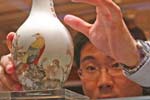China
Woman's death raises debate on overwork
Updated: 2011-04-15 07:31
By Li Xinzhu (China Daily)
High cholesterol, back pain and liver disease common for professionals
SHANGHAI - The death of a 25-year-old female employee with the Shanghai office of PricewaterhouseCoopers on April 10 has led to intense discussions over whether overwork threatens the health of white-collar workers.
Pan Jie, a junior auditor of the company, died on Sunday after contracting a case of acute cerebral meningitis that had developed from a flu virus, according to local media.
On March 31, Pan wrote on her micro blog: "Whenever there's a chance to take a break, a fever comes."
On April 1, she wrote that her white blood cell count had fallen to 1,800 - dangerously low.
There is no clear evidence linking Pan's death to her work at the company - except for her micro blog. Before dying, she had turned to the Internet frequently to complain about feeling tired and about her poor health, conditions she believed resulted from overwork.
Pan's death caused an instant uproar on the Internet, prompting public debate over the greater and greater health risks white-collars workers are subjected to in large Chinese cities like Shanghai and Beijing, where overwork and fatigue commonly lead to various occupational diseases.
More than 60 percent of the white-collar workers in large Chinese cities are faced with a risk of contracting maladies resulting from overwork, according to a survey carried out in 2010 by the Chinese Medical Doctor Association and the Chinese Hospital Association.
Another survey by the doctor association shows that health least prevails among employees in the manufacturing, financial and educational industries.
Of the maladies caused by a combination of long work hours, a lack of exercise and a poor diet, the survey found that high cholesterol, neck and lower-back pain and liver diseases are most common for white-collar workers. "I'm thinking about changing jobs," an anonymous senior accountant at the tax department of Ernst & Young (Shanghai) told China Daily. "In the peak season, which usually goes from January to March every year, we even have to work 80-hour weeks."
"I always feel tired and sleepy, and I have discomfort in my neck," he said. "I look very pale because of the long hours I spend staring at excel forms on the computer."
"Though the pay is good, I decided to change," said Qiqi, who is a 27-year-old former employee of Deloitte (Shanghai), a large international accounting and consulting firm. During busy times of the year, her former job had often given her only a day or even a half-day off a week.
"Although we knew about the heavy workload at the company before we joined, we still felt distraught by the relentlessly long work hours," she said. "I had a serious illness after I had left the company. It was probably because I suddenly felt relaxed."
Young people have been dying more and more in recent years from sudden onsets of cardiovascular disease, according to Fan Xiaohong, deputy director of the Shanghai Chest Hospital.
She said that apart from heavy workloads and related pressures, many white-collar workers are susceptible to disease because they don't exercise enough and don't manage their health properly.
Fan also called on white-collar workers, especially those in poor physical shape, to pay more attention to their own diets and mental conditions. She said everyone should undergo routine physical examinations.
China Daily
(China Daily 04/15/2011 page7)
Specials

Share your China stories!
Foreign readers are invited to share your China stories.

Art auctions
China accounted for 33% of global fine art sales.

Waiting for drivers' seat
Lack of sponsorship appears to be why Chinese drivers have yet to race in a Formula 1 event